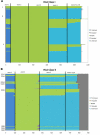A community standard for immunogenomic data reporting and analysis: proposal for a STrengthening the REporting of Immunogenomic Studies statement
- PMID: 21988720
- PMCID: PMC3636772
- DOI: 10.1111/j.1399-0039.2011.01777.x
A community standard for immunogenomic data reporting and analysis: proposal for a STrengthening the REporting of Immunogenomic Studies statement
Abstract
Modern high-throughput HLA and KIR typing technologies are generating a wealth of immunogenomic data with the potential to revolutionize the fields of histocompatibility and immune-related disease association and population genetic research, much as SNP-based approaches have revolutionized association research. The STrengthening the REporting of Genetic Association studies (STREGA) statement provides community-based data reporting and analysis standards for genomic disease-association studies, identifying specific areas in which adoption of reporting guidelines can improve the consistent interpretation of genetic studies. While aspects of STREGA can be applied to immunogenomic studies, HLA and KIR research requires additional consideration, as the high levels of polymorphism associated with immunogenomic data pose unique methodological and computational challenges to the synthesis of information across datasets. Here, we outline the principle challenges to consistency in immunogenomic studies, and propose that an immunogenomic-specific analog to the STREGA statement, a STrengthening the REporting of Immunogenomic Studies (STREIS) statement, be developed as part of the 16th International HLA and Immunogenetics Workshop. We propose that STREIS extends at least four of the 22 elements of the STREGA statement to specifically address issues pertinent to immunogenomic data: HLA and KIR nomenclature, data-validation, ambiguity resolution, and the analysis of highly polymorphic genetic systems. As with the STREGA guidelines, the intent behind STREIS is not to dictate the design of immunogenomic studies, but to ensure consistent and transparent reporting of research, facilitating the synthesis of HLA and KIR data across studies.
© 2011 John Wiley & Sons A/S.
Figures

References
-
- von Elm E, Altman DG, Egger M, Pocock SJ, Gotzsche PC, Vandenbroucke JP. The Strengthening the Reporting of Observational Studies in Epidemiology (STROBE) statement: guidelines for reporting observational studies. Epidemiology. 2007;18:800–4. - PubMed
-
- Little J, Higgins JP, Ioannidis JP, et al. Strengthening the reporting of genetic association studies (STREGA): an extension of the STROBE Statement. Hum Genet. 2009;125:131–51. - PubMed
-
- Khoury MJ, Little J, Gwinn M, Ioannidis JP. On the synthesis and interpretation of consistent but weak gene-disease associations in the era of genome-wide association studies. Int J Epidemiol. 2007;36:439–45. - PubMed
Publication types
MeSH terms
Substances
Grants and funding
LinkOut - more resources
Full Text Sources
Other Literature Sources
Research Materials

